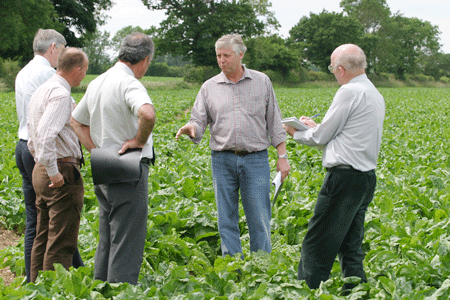FW Awards: Poul Hovesen encourages team responsibility

- Poul Hovesen
- Manor Farm, Salle, Norfolk
Arable farming has advanced considerably since Poul Hovesen started managing Manor Farm, Salle in Norfolk in the late 1980s. So too have the skills which saw him a finalist in Farmers Weekly’s 1992 Cereal Farmer of the Year competition.
Mr Hovesen pays tribute to that year’s winner, John Forrest, whose subsequent friendship led to the formation of a seven-strong farmer group keen to progress agronomy methods by regular meetings and visits to research establishments here and abroad.
“It gave us incredible stimulation to develop,” he says. In particular it led to a change of attitude towards cultivations. “At that time we used to think we could do everything we needed with power – but you can’t force Mother Nature.”
The move coincided with the arrival of a new agronomist, Peter Riley of TAG of which Mr Hovesen is a director.
Since then greater efficiency and a multi-skilled team operating on a flat management structure to encourage personal responsibility have allowed him to expand operations into other areas. These include contract farming as well as grain handling and storage for other producers and merchants.
He has diversified into growing Christmas trees on 37ha (91 acres) and from 2006 has been involved with a partnership farming 1200ha (2965 acres) in Poland growing seed potatoes.
Manor Farm is part of a shooting estate whose owner, Sir John White, is keen on conservation, notes Mr Hovesen.
“We encourage biodiversity working closely with conservation authorities to enhance the environment.” Hedges are particularly well-maintained and the amenity woodland area has been expanded to 50ha (124 acres).
His overall policy is to develop the estate as a thriving business, enabling it to withstand vulnerable commodity prices. It includes 31 rented properties and walled gardens selling produce through a box scheme.

The greatest challenge ahead, he believes, is climate change.
Cropping by the Salle Farms Company (blocked to ease management) extends to about 1800ha (4450 acres) on two main soils – sandy clay and, unusually for Norfolk, 20% boulder clay.
Having dabbled with continuous wheat Mr Hovesen has created an “optimised” and “safe” rotation, growing only first wheats with breaks of oilseed rape, sugar beet, spring beans and vining peas. There is also a substantial area of barley, both winter and spring.
Budgeted wheat yield, 9.5t/ha (3.8t/acre) is often exceeded. Oilseed rape averages 4.5-4.8t/ha (1.8-1.9t/acre), the extended rotation clearly helping, he believes. “But we haven’t yet hit 5t/ha.”
Provided each crop receives equal dedicated attention the rotation provides a relatively stable gross margin compared with chasing fashions, he explains.
“As well as having a healthy rotation you must put passion into each crop.”
That fervour is shared with a team of an arable manager and five main tractor drivers, supported by range of well maintained equipment including two Cat Challenger tractors, an 8m Vaderstad drill and a Claas 600 Lexion combine.
The farm is TASCC registered allowing it to trade directly with end users, including maltsters, and Mr Hovesen employs a range of marketing strategies, options and futures to safeguard margins.
The farm never entered Countryside Stewardship, the land being considered too productive, he explains. But set-aside was used to provide LERAP buffers and protect watercourses. “It made a lot of sense.”
Under ELS, further field margins were introduced, the farm became a pilot project for Catchment Sensitive Farming and Mr Hovesen a member of DEFRA‘s CFS Steering Group.
WHAT THE JUDGES LIKED
- Poul’s exceptional foresight in motivating a team to deliver remarkable standards displayed in all his crops
- His firm grasp on everything affecting the business, both large and small, and a commonsense approach to marketing
- His real “feel” for the farm’s soils and their cultivation needs, being ready to flex as required and recognising the importance of timeliness
- His development of several complementary diversified businesses
FARM FACTS
- 1800ha in-hand estate
- Mainly sandy clay soils
- Annual rainfall: 630mm
- Cropping: Wheat, oilseed rape, spring beans, vining peas, and winter and spring barley

